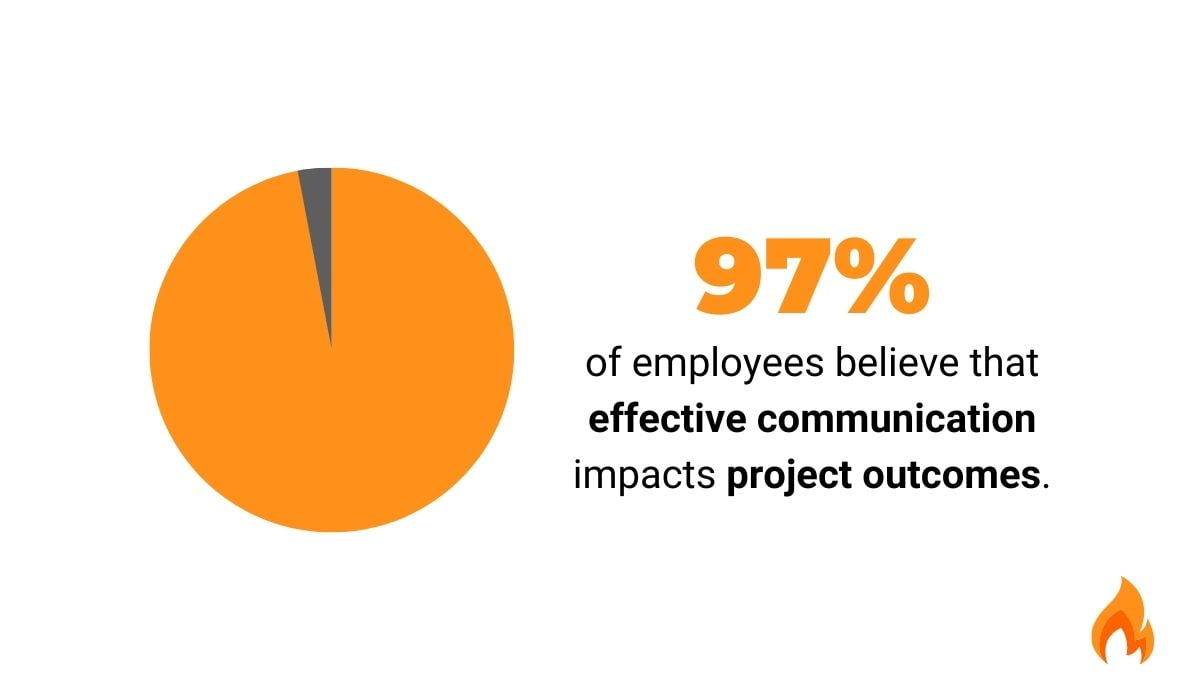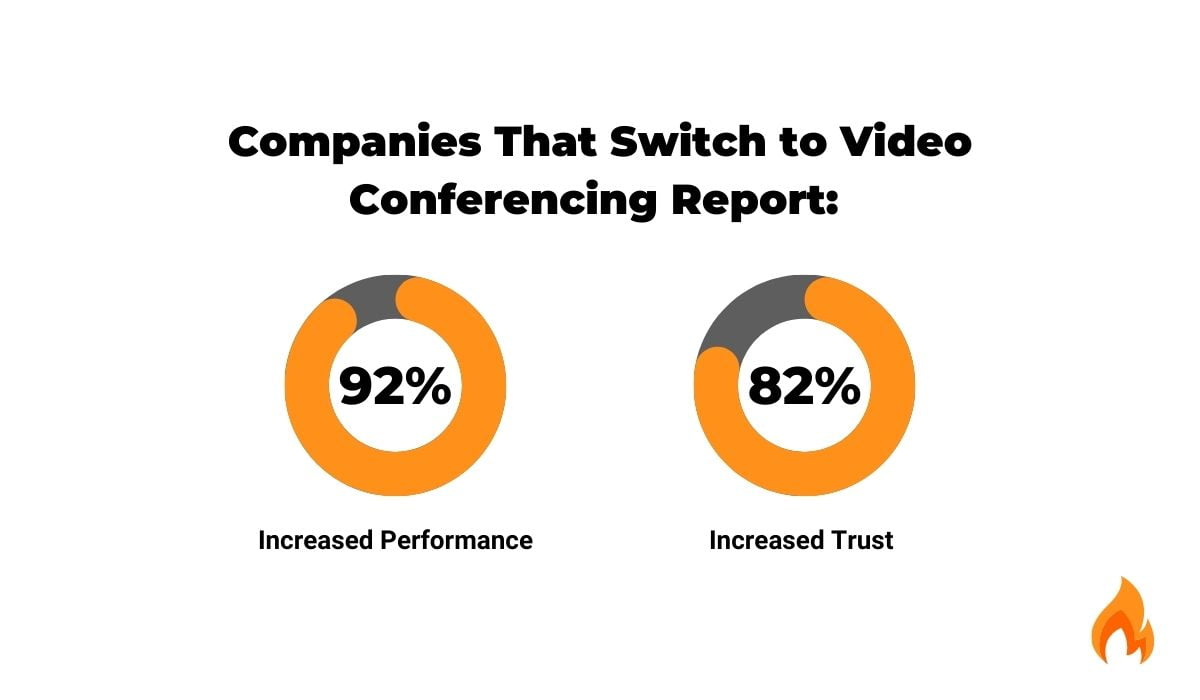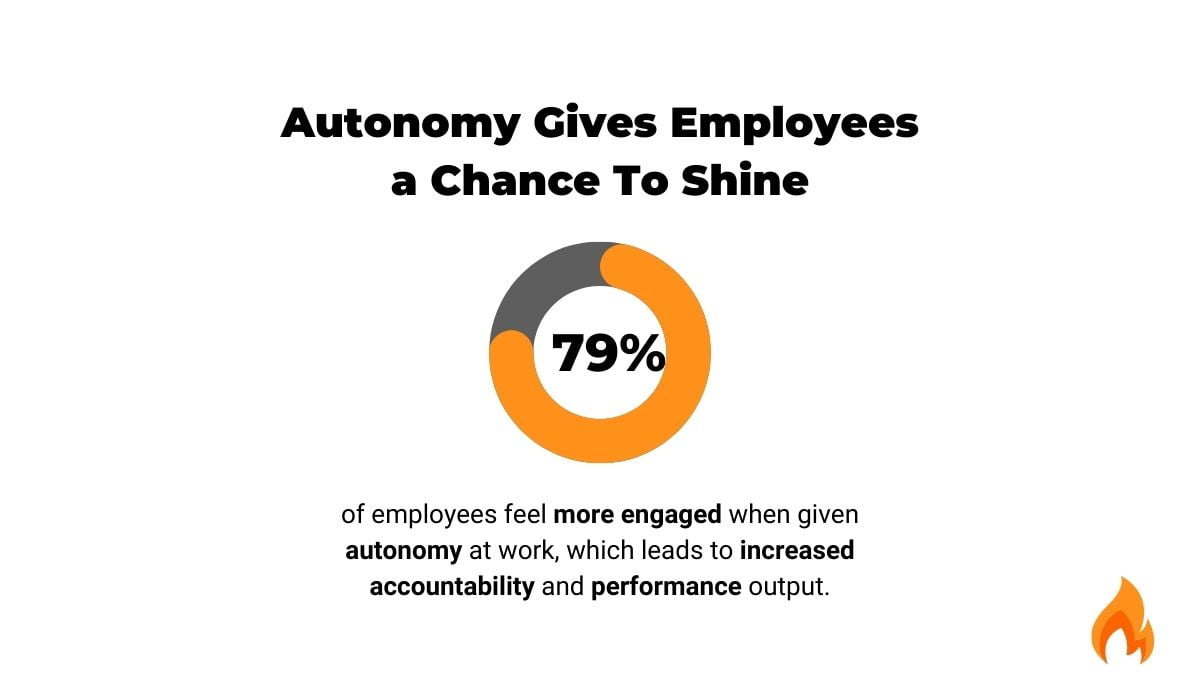Working With Remote Teams: 5 Essential Strategies for Success

This blog post is specifically designed for remote software development teams. We’ll look at five key tactics meant for successfully negotiating the complexities of virtual, remote collaboration.
By offering these techniques, we hope to better equip software development teams with the tools needed to succeed in a remote working environment, from goal-setting and communication to technology adoption and work-life balance.
Let’s get started.
Establish Clear Communication Channels
Effective communication plays a crucial role in promoting collaboration, enhancing productivity, and ensuring the successful completion of projects. According to one study, 97% of employees believe that effective communication impacts project outcomes.

In a remote setting where team members are physically distant, clear communication becomes even more critical. It enables developers to exchange ideas, share feedback, and coordinate their efforts seamlessly.
So, how do you ensure clear, high-quality communication within your remote team? Well, there are actually two key components:
Tech Stack
Utilizing collaborative tools like project management platforms, video conferencing, and instant messaging apps facilitates real-time collaboration and fosters a sense of unity among team members. Visual cues, gestures, and facial expressions enable clearer communication of ideas, reducing the chances for misinterpretation. This leads to improved understanding among team members and minimizes errors.
With communication platforms becoming the norm in business, there are more and more incoming data to support these claims. For example, one study showed that organizations that use Zoom report major improvements in team performance as well as increased trust.

Structure
The other element needed for effective communication in remote teams is structure. Structured communication routines provide a framework for regular and meaningful interactions within remote teams. Examples of structured communication include:
- Daily Stand-ups: Brief daily meetings where team members share updates on progress, challenges, and priorities.
- Weekly Team Meetings: Scheduled meetings to discuss project updates, address any roadblocks, and align team goals.
- Collaboration Channels: Dedicated channels for specific projects or topics, allowing team members to collaborate and exchange information.
By exploring technology and establishing structured communication routines, remote development teams can maintain open lines of communication, promote collaboration, and ensure everyone remains informed and aligned.
Set Clear Expectations and Goals
Remote teams shine when there is a shared understanding of individual roles, responsibilities, and overall objectives. It’s vital to establish clear project expectations, ensuring all team members have a shared understanding of the project’s goals, objectives, and desired outcomes.
When everyone is aligned, they can work towards a common vision, reducing misunderstandings and potential conflicts, while encouraging alignment among all team members. Regularly providing progress updates and fostering an environment where team members feel comfortable asking questions and seeking clarification are essential practices for remote development teams.
Here’s how alignment on goals and expectations specifically benefit remote teams:
Promotes Transparency
Because team members are not physically together, it can be difficult to gauge the progress of individual tasks or the overall project. By regularly providing progress updates, team members can keep everyone informed about their work, achievements, and potential challenges they’re facing. This promotes transparency and ensures that everyone has visibility into the project’s status and goals, leading to a shared understanding and better coordination.
Supports Remote Team Bonding
Remote work can sometimes lead to feelings of isolation or disconnection. Fostering an environment where team members feel comfortable asking questions and seeking clarification from their mentors and supervisors creates opportunities for virtual interactions and collaboration. That way you can build rapport, strengthen team bonds, and promote a sense of camaraderie despite the physical distance.
Increases Adaptability
Remote teams often need to be adaptable and responsive to changes in project requirements or priorities. By maintaining open lines of communication and regularly updating progress, team members can quickly adapt and adjust their work accordingly. Maintaining a sense of agility helps remote teams respond to evolving circumstances and deliver high-quality results.
By implementing these practices, every member of the remote team will know what’s expected of them so they can work cohesively towards project success.
Foster a Strong Team Culture
Fostering a strong team culture is essential for remote software development teams to thrive and achieve their goals. To quote Lou Gerstner, former CEO of IBM, “Culture isn’t just one aspect of the game – it is the game.” This quote underscores the idea that culture is not an isolated element within an organization but rather the fundamental driver of its success.
A strong team culture creates a sense of unity, shared purpose, and belonging among team members despite physical distance. Here are several strategies for fostering a strong team culture in a remote setting:
Shared Values and Purpose
Establishing shared values and defining mission, vision, and purpose is vital for building a strong team culture, particularly for remote teams. To provide just one example, here at Newfire, our core values include:
- Continuous Self-Improvement: Stay curious and be willing to be challenged.
- Transparency and Open Communication: Trust others and trust will be returned.
- Respect for the Individual: Accept everyone has their own history and future.
These shared values serve as guiding principles and provide a sense of direction, creating a cohesive and unified team identity that persists regardless of physical distance.
Recognition and Celebration
Celebrating team achievements and recognizing individual contributions is crucial for building a positive team culture. Remote teams can implement recognition programs like virtual shout-outs or awards to acknowledge team members’ efforts and successes. Publicly acknowledging and appreciating individuals’ contributions not only boosts morale but also reinforces a culture of support and recognition.
Continuous Learning and Development
Encouraging a culture of continuous learning and development helps remote teams stay adaptable and innovative. Providing opportunities for skill-building, offering access to learning resources, and promoting knowledge sharing within the team can foster a culture of growth and improvement. This is another tenet of Newfire’s culture. Each one of our team members is granted a yearly education and development budget as well as personal days to attend conferences and other educational events.
Diversity and Inclusion
Embracing diversity and inclusion is crucial for a strong team culture. Remote teams should strive to create an inclusive environment where all team members feel valued, respected, and heard. Actively promoting diversity, seeking diverse perspectives, and ensuring equal opportunities for participation contribute to a rich and vibrant team culture.
By focusing on these aspects and strategies, remote software development teams can foster a strong team culture that promotes collaboration, innovation, and a sense of belonging. A strong team culture not only enhances team performance but also contributes to individual well-being and overall team satisfaction.
Cultivate Trust and Autonomy
One mistake team leaders and managers often make when switching to a remote work model is increasing oversight and exercising more control over their teams because they think productivity will suffer when team members are no longer under direct supervision. But actually, the opposite is true.
When individuals have autonomy over their tasks and responsibilities, they can work more efficiently and take ownership of their deliverables. This boosts overall productivity and reduces the need for micromanagement.
In fact, a vast majority of employees say that increased autonomy makes them more engaged at work, fostering a sense of accountability and leading to improved results.

Here at Newfire, we’re aware that autonomy leads to increased productivity. We also know that our teammates deserve trust, which is why we’ve made it a company policy that our team members have complete control over their working schedule and that no time trackers are applied to supervise their work. Team members are encouraged to make their own decisions and their skills are developed through regular feedback.
By cultivating trust and autonomy, remote software development teams can create a supportive and empowering work culture leading to increased collaboration, productivity, job satisfaction, and personal growth for team members.
Emphasize Self-Care and Work-Life Balance
Last but not least, emphasizing self-care and work-life balance is crucial for the well-being and success of remote software development teams. The nature of remote work can blur the boundaries between personal and professional life, leading to potential burnout, decreased productivity, and diminished overall satisfaction.
Here are several key reasons why self-care and work-life balance should be prioritized in a remote team:
Mental and Physical Health
Remote work can bring unique challenges such as increased sedentary behavior, isolation, and longer working hours. Prioritizing self-care allows team members to focus on maintaining their mental and physical well-being.
Encouraging regular breaks, physical activity, healthy eating, and sufficient sleep promotes better overall health, reduces stress, and enhances cognitive function. A good way to encourage this is to offer gym memberships or exercise classes for your team members as well as offering plenty of paid time off so that workers have time to recharge.
Productivity and Performance
Research has consistently shown that excessive work hours can lead to decreased productivity and poor performance. One notable study actually showed that managers could not tell the difference between employees who worked eighty hours per week and those who just pretended to. That means that overworking doesn’t lead to better results, just tired employees.
Striking a balance between work and personal life allows team members to recharge and return to work with increased focus, creativity, and energy. By encouraging employees to log off regularly, remote teams can optimize productivity and maintain high-quality work output.
Employee Retention and Satisfaction
A healthy work-life balance is closely tied to employee satisfaction and retention. When team members feel supported in managing their personal commitments and maintaining a fulfilling personal life, they’re more likely to experience job satisfaction and remain engaged with their work. This, in turn, contributes to higher employee retention rates, reducing recruitment and training costs for the organization.
Collaboration and Team Dynamics
Strong teamwork and collaboration are vital for remote software development teams. Encouraging self-care and work-life balance fosters a positive team environment, as team members feel respected and supported in taking care of their personal needs. This, in turn, strengthens team dynamics, trust, and communication, ultimately enhancing collaboration and teamwork.
In summary, prioritizing self-care and work-life balance in remote software development teams promotes mental and physical health, boosts productivity and performance, enhances employee satisfaction and retention, strengthens collaboration and team dynamics, stimulates creativity, and cultivates a positive team culture. By recognizing the importance of self-care, remote teams can create a supportive and thriving work environment that benefits both individuals and the overall team’s success.
Conclusion
Remote working continues to be “the norm” in modern software development and Newfire is proud to be a part of this revolution. Our team members span four continents and more than a dozen countries, and we offer all of them a work-from-anywhere option. That means everyone at Newfire is free to work from the comfort of their own home, one of our cozy offices around the globe, or even a sunny beach.
If you want to build a cohesive, agile, high-performance team for your next tech project, get in touch today so we can connect you to the best (and happiest) talent the world has to offer.

Orlando is an IT recruiter and travel enthusiast with boundless energy, a zest for life, and an infectious sense of humor. His work enables him to unite all of his passions: searching for top tech talent, exploring cultures, and leaving lasting impressions.